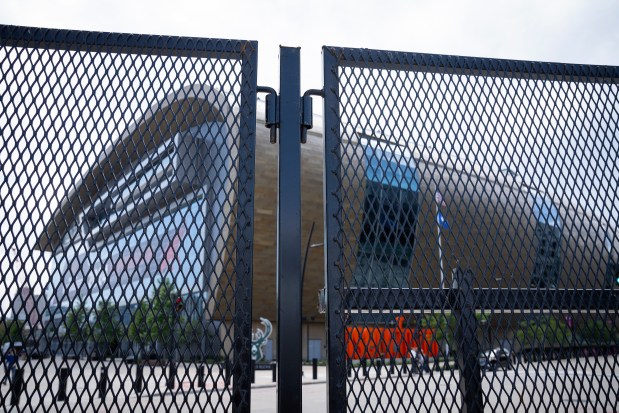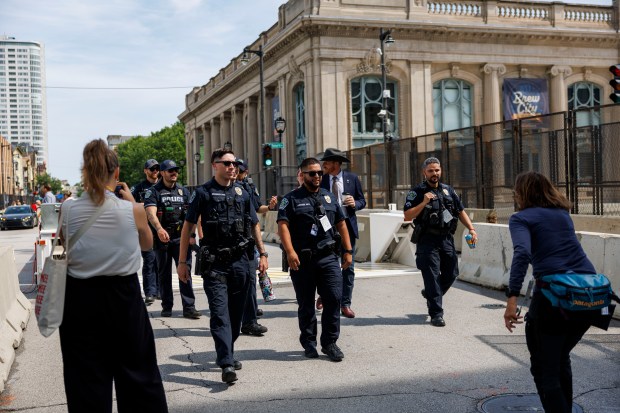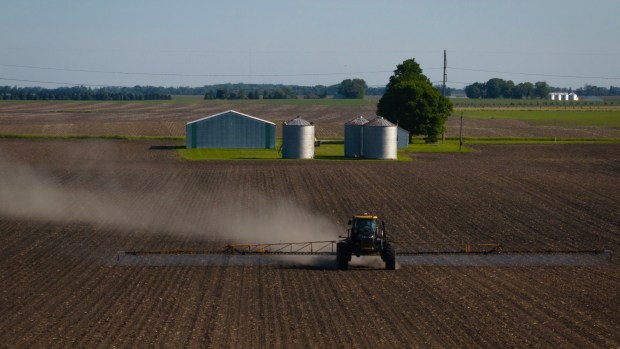As the Republican National Convention kicked off Monday morning in Milwaukee, just days after President Donald Trump was the target of an apparent assassination attempt Saturday at a Pennsylvania rally, hundreds of protesters in Chicago crossed the Illinois-Wisconsin state line to raise their voices for liberal causes.
In Milwaukee, Jeff Fleming, the mayor’s director of communications and public engagement, said law enforcement officials were “well-equipped to manage the issues the city is responsible for” following the most serious attempt to assassinate a president or presidential candidate in about 40 years.
The gunman who shot at Trump grazed his ear. One spectator was killed and two others were critically wounded. The gunman, who was not inside the rally but on a nearby roof, was killed after the event.
Large protests were expected at the RNC long before the assassination attempt.
Andy Thayer, a Chicago activist, said the attack had brought increased scrutiny to Milwaukee from politicians on all sides. Thayer, who planned to champion abortion and LGBTQ rights, said he has protested at several political conventions in the past — both Republican and Democratic.
“The local authorities have very typically tried to raise the specter of chaos and violence to try and scare people away from exercising their First Amendment rights,” Thayer said in an interview with the Tribune before boarding his train to Milwaukee Monday morning.
The city of Milwaukee secured a $25 million increase on a federal security grant to help host the presidential nominating convention, according to Fleming. Chicago received the same amount for the Democratic National Convention, which will be held next month, from Aug. 19-22.
Approximately 80 officers from Chicago joined dozens of police departments from across the country in Milwaukee to help manage protests. Fleming said the Pennsylvania attack hadn’t changed any logistical plans regarding personnel and equipment to control outside protesters.
“There’s a formal process of reaching agreements with the individual law enforcement agencies that are represented here, so that wasn’t something we could change in 12 hours,” Fleming said.
The convention is being held in the Fiserv Forum, home of the Milwaukee Bucks, from Monday to Thursday, with 2,500 attending delegates expected to formally nominate Trump. The former president is also expected to announce a running mate.
On Sunday, at a news conference at Red Arrow Park just east of the main convention site, Omar Flores, co-chair of the Coalition to March on the RNC, said that despite the weekend violence against Trump, protesters would march as planned.
Flores said protesters in and outside Milwaukee had spent nearly two years planning with the city, engaging in similar legal battles to Chicago groups who have fought for months to get permits to march within “sight and sound” of the Democratic convention in August.
“We’ve always prepared for the worst and we’re expecting the best,” Flores said.

Faayani Aboma, a member of the Chicago Alliance Against Racist and Political Repression, which has an affiliate group in Milwaukee, said at least two dozen protesters from the group in Chicago were carpooling to the convention Monday morning.
“We’re not intimidated. We’re strong as a big unit,” he said.
Aboma said he had been on non-stop calls since he heard the news about the attempted assassination Saturday.
David Phelps, an abortion rights advocate from the Chicago area who works in tech, said he boarded an early morning train to Milwaukee because he felt the upcoming presidential election in November could be “very depressing” for the future of reproductive rights in the United States.
Weeks after the second anniversary of the Dobbs v. Jackson decision, which overturned the constitutional right to an abortion, the Supreme Court has become a central issue in the election. Though there are no open vacancies on the court, the president may make appointments in the next election — which Phelps said could have a ripple effect on women seeking safe abortions in Illinois and elsewhere.
“My way of dealing with it is doing something about it,” Phelps said.
The thousands of protesters in Milwaukee plan to march on five pillars: to fight the Republican Party; to defend women’s, LGBTQ and reproducive rights; to stand up for immigrants; to promote peace, justice and equity; and to stand with Palestine.
After their protests wrap up in Wisconsin, they plan to move south to Chicago to do the same in August for the Democratic National Convention.




